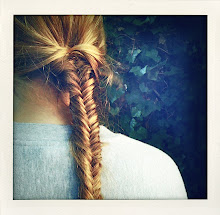 |
| Photograph by Hannah Schultz |
About three years ago, I bought a cheap 120 mm film camera for myself: the Holga. Made out of plastic, the Holga is known for producing light-leaks, vignette blurring, and inspiring creativity in its users. Basically, it's so low quality, you can never tell how your pictures will actually turn out. Growing up in a digital age, I used to think film cameras were as outdated as cassette players. I didn't have the slightest idea how they worked. I bought my Holga because I was curious. I wanted to see what I could create. But because I didn't even know how to load film, it mostly sat in my room as a decoration piece. Thankfully, one of the first friends I made at Western Washington University was a photography major, and an extremely patient teacher. I took my first film photograph in her dorm room of our friend Maddy. I double-exposed it so that she'd be in the picture twice, while a poster of John Lennon lingers in the background. That picture remains one of my favorites.
To this day, my Holga photography has been pretty experimental. Sometimes I ruin entire rolls of film by over-exposing them or continuing to load the film incorrectly. As much as I'd like to say that I've become photo-savvy, I know that I still have a lot to learn. The slideshow below contains my nine favorite photographs that I've taken the last three years. I display about twenty-five on a wall in my room, but in my opinion, these nine are the best quality. One of my favorite things about film photography is the risk and patience involved. It feels more like art. Every roll of film is, essentially, a mystery until it's developed. For that reason, I feel a lot more connected to my film photographs than my digital. I invest a lot in them, and when they're developed, I love that I can hold them in my hand. These photos on my wall remind of memories, but they also remind me that as technology progresses, old-fashioned techniques will disappear unless people, like me, hold on.






